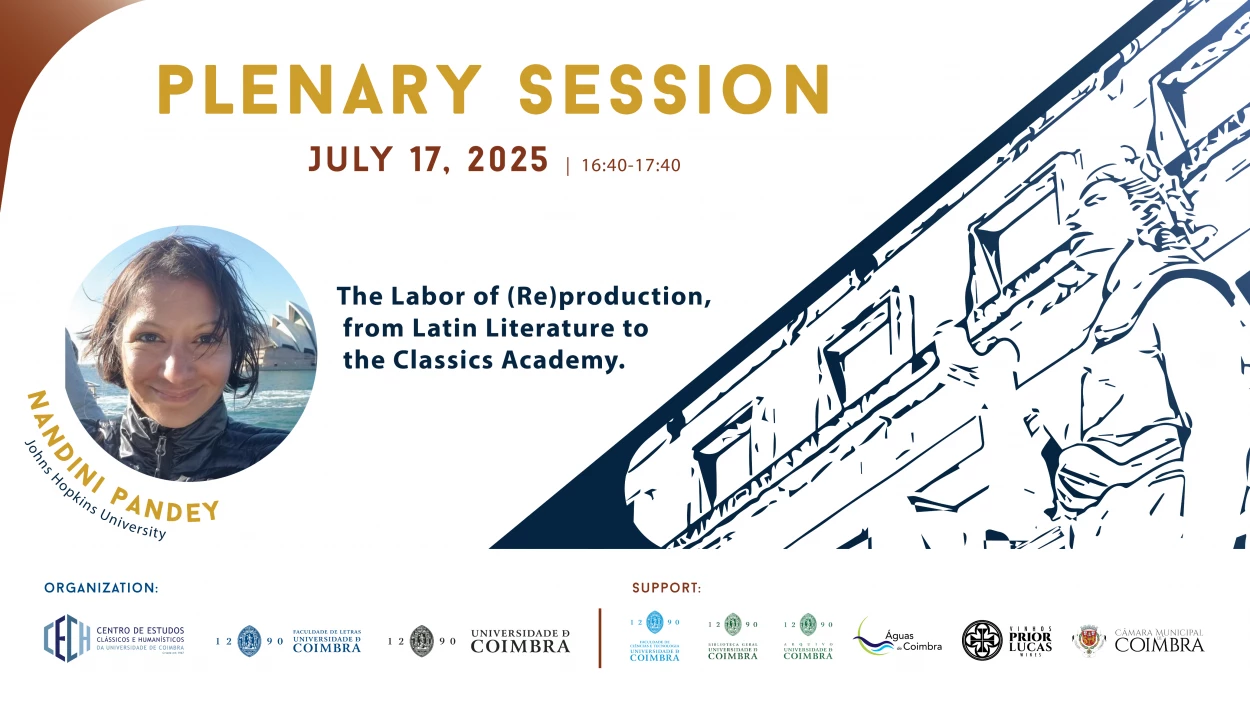The Opening and Plenary Sessions will take place at the Faculty of Arts and Humanities of the University of Coimbra (FLUC), in the Teatro Paulo Quintela (located on the 3rd floor, just one level below the main entrance). Except for the last Plenary Session, the sessions will be broadcast live on the CECH YouTube channel.
Opening Session
July 15 | 10:45 - 11:20
Este conteúdo é reproduzido a partir de uma fonte externa e não está disponível porque os cookies não foram aceites.
Eis o que pode fazer:
Marion Meyer
University of Vienna
marion.meyer@univie.ac.at
Athena and Her Divine Cult Associates: Anchoring innovations in myth.
Recent studies suggest that the temple for Athena and Hephaistos on the Kolonos Agoraios had already been planned at the beginning of the 5th century BCE and that its foundations were laid ca. 480 BCE (Miles and Lynch 2024). This calls for a reexamination of the association of these two divinities. I have argued elsewhere that Hephaistos was incorporated into the charter myth of Athens, Erechtheus’ birth of the Earth and adoption by Athena, in the course of the 6th century whereas another Athenian charter myth, Erechtheus’ defense of Athens against an attack from Eleusis, was remodeled in the context of the Kleisthenic reforms and enriched with a conflict on the level of divinities, Poseidon’s challenge of Athena as tutelary goddess - a conflict that was resolved with the institution of the cult of Poseidon Erechtheus (Meyer 2017). The paper will reconsider the strategies for anchoring these substantial innovations of myths about Athena as the Athenians’ main goddess in the light of the new results.
Chair: Luuk Huitink
July 15 | 17:45 - 18:45
Este conteúdo é reproduzido a partir de uma fonte externa e não está disponível porque os cookies não foram aceites.
Eis o que pode fazer:
Dennis Pausch
Philipps-University Marburg
dennis.pausch@uni-marburg.de
Keep on Reading! Strategies against Fatigue and Apathy in Livy’s Ab urbe condita.
Livy repeatedly and explicitly address the risk that his readers might lose interest in view of the abundance of material covered in the 142 books of his work reaching from the founding of the city of Rome to his own times. To counteract this, he emphasises, among other things, the emotional engagement and the pleasure associated with reading, but also the gain in knowledge and the importance of history for Roman identity and self-image. His categories offer themselves indeed to comparison with those used by Rita Felski (enchantment, shock, knowledge, recognition) and I would therefore like to take a closer look on the relation between his explicit remarks (in the preface, but also in other passages) and the practical employment of strategies against fatigue and apathy in his work. Building on my previous work on Livy’s interaction with his readers mainly by narrative means, I would thus hope both to get to a better understanding of the concepts behind the decisions of this individual writer and to contribute to the panel and his comparative approach as a whole.
Chair: Edward Armstrong
July 16 | 16:40 - 17:40
Este conteúdo é reproduzido a partir de uma fonte externa e não está disponível porque os cookies não foram aceites.
Eis o que pode fazer:
Nandini Pandey
Johns Hopkins University
npandey3@jhu.edu
The Labor of (Re)production, from Latin Literature to the Classics Academy.
“What’s someone like you doing in classics?” As an Indian-American woman, I’ve gotten this question throughout my career. This plenary lecture invites conversation about the roles of identity, disciplinary training, and (self-)erasure as we approach specific topics like that of my panel – on Cicero and the Augustan poets – as well as the broader future of our field.
Following the auto-ethnobiographical mode of my forthcoming book on Roman diversity, I examine the social and cultural forces that drew me to classics as well as the obstacles I hit when reading Cicero and the Augustan poets. Why is it that writers like Cicero and Livy admire dead women and feminine abstractions more than the flesh-and-blood people with wombs who surrounded them, or for that matter, the enslaved people who reproduced their literary labors? Are poets like Vergil following these authors’ patrilineal leads in erasing real laboring people in favor of a fantasy of elite male self-replication, further proliferated by our literary canon? And how are we, as scholars and as humans, implicated in these dynamics as we attempt to reproduce our ways of thinking and producing?
Informed by Christopher Londa and Ximing Lu, inspired by Elena Giusti and Victoria Rimell (co-editors of “Vergil and the Feminine,” for Vergilius, 2021), this talk will ask more questions than it answers about our scholarly investment in self-replicating systems of intersectional power. The big question: how do the ‘family’ dynamics of our field(s) affect our scholarly output, our training of younger generations, and our vision of the future? How can we overcome intergenerational trauma to imagine positive ways forward that transcend self-replication?






